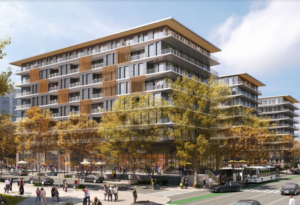
The 322,000-square-foot building B at the Mary Ellen McCormack redevelopment on Old Colony Avenue in South Boston will include 302 mixed-income apartments. Image courtesy of CBT Architects
The high cost of NIMBYism to both developers and communities has made the news more than ever lately, with reporters often perpetuating the belief that community engagement is the primary roadblock to the creation of more affordable housing.
But it doesn’t have to be this way – as evidenced by the fact that WinnCompanies actually sped up the entitlement process for the redevelopment of the Boston Housing Authority’s antiquated Mary Ellen McCormack apartment complex by creating meaningful and equitable community engagement online.
The project’s primary goal is the one-for-one replacement of 1,016 existing affordable housing units in South Boston (with each existing household guaranteed the right to return), as well as the creation of over 2,000 new middle-income and market-rate apartments. When completed, the development will also feature a broad range of amenities, including a Community of Opportunity Center with job training, educational classes, and children’s and senior’s activities.
WinnCompanies’ development team took a unique approach to the project plan from the time they were initially selected by the BHA. Rather than approaching development with a complete plan, WinnCompanies presented a set of principles and design guidelines to the community in 2018, and then asked for input to shape what the project would become.
With a large number of stakeholders involved and no existing community center onsite, project leaders knew they would need a hybrid approach to get information to residents in order to have a two-way dialogue. The development team worked hard to develop a strong partnership and trust with residents, primarily the resident-led and elected Mary Ellen McCormack Task Force.
In addition to having team members hold office hours at the property two days a week and hosting numerous community meetings, WinnCompanies launched a project page on the coUrbanize platform to engage stakeholders who were unable to attend traditional meetings, or who speak Spanish or Chinese.
Feedback Accelerated Entitlement Timeline
This approach empowered WinnCompanies to incorporate key resident feedback into the project plans, including planning for a washer and dryer in each unit, committing to pay for basic utilities in affordable units and creating ground-floor, direct-entry units similar to the townhomes that exist at the site today.
Community members also provided guidance on the social programs they favored in the new Community of Opportunity building and on the project’s retail leasing strategy, emphasizing a “local first” approach that prioritizes woman-owned and minority-owned businesses from the surrounding neighborhood.
“Once entitlement began, coUrbanize allowed us to move quicker through the process because we were able to demonstrate how informed and engaged the residents are,” WinnDevelopment Vice President Drew Colbert said. “The documented feedback we received from stakeholders, and subsequent changes to our plans as a result, were provided to agencies. This eliminated extra time and meetings where we would present back-and-forth updates with residents, and justification of changes to the reviewing agencies.”
The ROI of Community Engagement
Depending on the project, we’ve heard from coUrbanize clients that delays can cost anywhere from $10,000 to over $1 million per project – and delays are common, with the entitlement process often taking several months more than expected, projects being denied altogether, or significantly reduced in size and scope.

Karin Brandt
“In communities where we haven’t used coUrbanize and faced opposition, entitlements can drag on for an additional 12 to 18 months,” Colbert told us. “The cost is probably in the tens to hundreds of thousands of dollars with additional permitting, legal and overhead expenses plus costs associated with design changes. In an inflationary environment, delays cost even more money; construction budgets increase anywhere from 5 to 10 percent year-over-year while rising interest rates decrease supportable debt.”
With that kind of money at stake, more developers should look to the example of the WinnCompanies and commit to online community engagement to activate their project’s silent supporters and, most importantly, create a meaningful and equitable dialogue with residents from the outset.
Karin Brandt is CEO and founder of coUrbanize.




